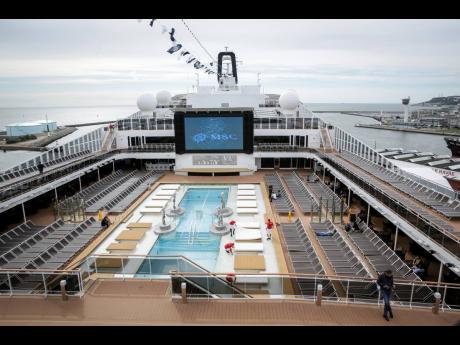Develop internal capacity to deal with coronavirus – Tufton
Amid efforts of the Government to stop the novel coronavirus from venturing onto our shores, Minister of Health and Wellness Dr Christopher Tufton is calling for cruise lines to collaborate with the World Health Organization (WHO) in developing an internal capacity to test and deal with the outbreak on-board the vessels.
Last Tuesday, a cruise line with more than 4,500 passengers and more than 1,600 crew members was denied access to the port in Ocho Rios, St Ann when it was discovered, upon the inspection of local health authorities, that a crew member on board was displaying symptoms of the virus.
According to the minister, cruise lines should be able to test for the virus on board these vessels or coordinate with the respective countries, based on their travel plans, to allow any testing to be done in the shortest possible time.
“I am making the call to cruise lines, given their size in terms of population, the length of stay of a passenger or guest as well as crew, and the fact that the vulnerabilities that they would encounter with any possible outbreak of virus on board would perhaps have a multiplying impact.
“The cruise industry represents a much different challenge than the airline industry. They are larger, passengers stay on board for longer periods and, because of the confinement of the vessels over this period, they become more vulnerable,” Tufton said.
Further, the health minister shared that, based on the size of Jamaica along with its limitations, it is impractical to expect local health authorities to respond to these challenges within the short time that a cruise normally docks at port, and not create disruptions when there are reasons to investigate further.
in breach of the Act
In the meantime, Tufton added that the cruise vessel which was denied access to the port on Tuesday, was in breach of the Quarantine Act, as the authorities did not file that they had a problem on board.
According to Section 20 of the Quarantine Act 1951, “it shall be the duty of the master of every ship which is in any port of the island forthwith to notify a visiting officer (whether the information is requested or not) of any case or suspected case of infectious disease in the ship and of any circumstances on board which are likely to lead to infection or the spread of infectious disease including in his notification particulars as to the sanitary condition of the ship … and any master of a ship who contravenes or fails to comply with these requirements shall be guilty of an offence against these Regulations.”
“Normally, if there is a health issue on board a vessel the captain should file with the health authorities of the respective country immediately as they discover that and, in this case, they had somebody in isolation and did not file, and, when our health people boarded the vessel, they found out. The vessel is subject to be fined because of that breach, because it is a breach,” Tufton said.
increase in cases
The coronavirus outbreak has spread from China to at least 40 countries around the world. A recent increase in cases in Italy, Iran and South Korea has heightened concerns about the ability to contain the spread of the virus.
The viral outbreak has infected more than 82,000 persons globally.
WHO reported that, while the virus is not yet a pandemic, it is urging countries to prepare for its arrival, on the assumption that a declaration may come. A pandemic is when an infectious disease spreads easily from person to person in many parts of the world.
In a press briefing on Thursday, Tufton said, based on the announcement of the health organisation, additional countries will be incorporated into the travel restrictions.
He said this is because the majority of cases in those countries have been because of in-country transmission.
The countries added are Italy, South Korea, Singapore and Iran. According to the minister, based on information received of the 164 cases of the virus and one death, after review, he will advise the country if it will be included in the list of restricted countries.
Brazil’s government confirmed on Wednesday that a 61-year-old Brazilian man who travelled to Italy this month has Latin America’s first confirmed case of the coronavirus.
In the meantime, authorities in the United States are now concerned as a California woman with no known connection to travel abroad or other known causes, is believed to be the first in the country to contract the virus.

